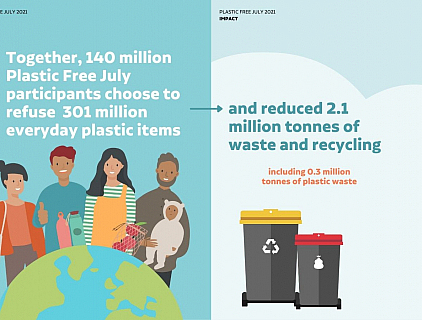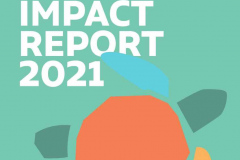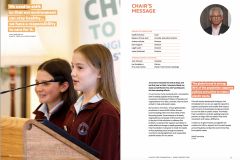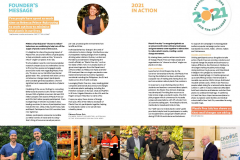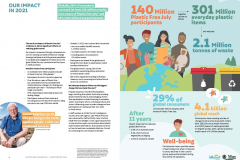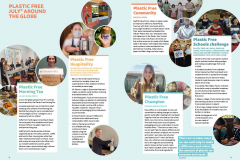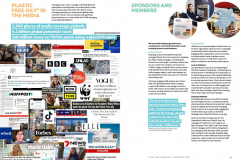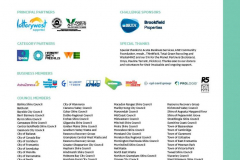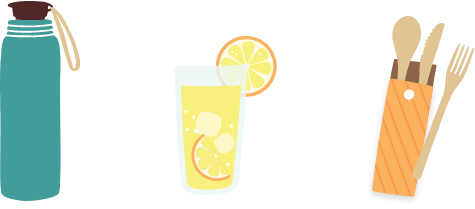2021 Global Reach and Impact
The Plastic Free July Team | 25 November 2021
Since we began in 2011, millions of participants’ “choose to refuse” behaviours are combining to help turn off the supply of plastic waste at the source.
We’re delighted to share this years’ results in our Plastic Free July Impact Report 2021 including the efforts of participants to help end plastic waste as they “choose to refuse” single-use plastic every day.
Together, as a global community, we are making a real difference.
Measured impact
The reach and impact of Plastic Free July® combines to deliver significant effects on reducing global waste.
The Foundation recently commissioned global research company Ipsos to undertake a survey to find out how aware and engaged people around the world were regarding Plastic Free July. The Ipsos survey identified spectacular global reach, which combined with other surveys on behaviour change impact (participants and Australian general population) showed significant and measurable reduction of plastic waste.
Modelling of the survey findings by consulting Behavioural Economist Colin Ashton-Graham showed 29% of global consumers (at least 313 million people) were aware of Plastic Free July and 13% (140 million people) participated.
Headline results from participants
An estimated 140 million people took part in Plastic Free July 2021 globally
- Participants from 190 countries signed up
- Over the eleven years of Plastic Free July, participants have accumulated 301
- million behaviour changes (2.2 changes per participant per year) – choosing to refuse single-use plastics
- 87% of participants had made at least one lasting change
- Participants reduced their waste and recycling (across the last three years) by 15kg per person per year (3.5% less waste)
- Participants are ahead of the global trend, being 13% more likely to adopt plastic waste avoidance behaviours
- The global trend is strong: 91% of the population supporting policies and action to reduce plastic waste
- 155 events registered including workshops, cleanups, movie screenings and online forums across six continents
- From its beginnings in Western Australia in 2011, leading countries (in terms of participation) now include the USA, China, India, South Korea, Italy and Brazil
- Globally, in 2021, they reduced their household:
- non-recoverable (landfill) waste by 1.2 million tonnes
- recyclable waste by 0.9 million tonnes
- including plastic consumption by 0.3 million tonnes
Biggest changes
We asked participants ‘What was the biggest change that you made this year?’
Popular responses included refusing plastic bags, switching from plastic food wrap, avoiding plastic bottled products and packaging. Stories from participants included investing in reusables, simply choosing to refuse, switching products and stores, influencing stores to make change and one participant even setting up their own store in South Africa.
A staff member at GCHQ, the UK’s intelligence, security and cyber agency, said “Plastic Free July was welcomed by staff at GCHQ, many of whom made their own pledges. It was a good opportunity to stop and have open conversations about plastic, explore plastic alternatives, and educate ourselves on how to lead more sustainable lifestyles. We will be continuing this conversation internally.”
Behaviour change
Individual behaviour change is the seed of cultural and systems change. Worldwide we saw municipalities making changes from installing drinking water stations (Sydney, London and Florida) to proclamations designating the month officially as “Plastic Free July”, such as the State of New York.
In Australia dozens of government agencies from the Department of Home Affairs to Melbourne Water and NSW Department of Primary Industries took part. Bans on single-use plastics were implemented and announced by regulators worldwide including the Philippines, the EU and states across the US and Australia.
Stories from around the world
Across the globe, groups from 97 countries were inspired by the Plastic Free Morning Tea.
- On World Ocean Day, Government House in Canberra hosted a Plastic Free Morning Tea for students, parents and school staff.
- A popular approach was to transform team meetings into a Plastic Free Morning Tea. Rethink Recycling Co-op in Australia hand wrote pledges such as “I pledge to use a keepcup for all my coffees”.
- Sofia from Verde Agua Consulting in Spain served a plastic free breakfast with hand- brewed coffee in reusable mugs to her entrepreneurial group.
And stories of plastic free hospitality initiatives such as:
- Bars on Greek Islands switching to reusable straws
- Supermarkets in New Zealand switched to reusable produce bags.
- A lodge in Queensland banned plastic water bottles, reducing associated waste by 95%.
- In the Philippines, food service businesses reduced single-use plastics by eliminating disposables and promoting refill systems, use of reusable containers and deposit-return schemes.
- Cafes in Tasmania switched to a refillable milk keg system and stores selling milk in refillable glass bottles.
Media Coverage
Throughout July, news coverage worldwide featured participant’s inspiring actions to reduce plastic waste from our growing community with diverse stories of change shared across localised and global media networks. Plastic Free July experienced significant brand awareness on social media with TikTok emerging as an influential platform.
- 1,300 pieces of media coverage globally (in English alone)
- 4.1 billion global potential reach
- 118 million views on TikTok posts using #plasticfreejuly
From Kikuchi City library in Japan who translated our animation, set up a display and ran events to 12 year old Iluka in Queensland Australia who took the challenge with her family and switched to buying local produce and buying from bulk food stores as well as investing in a soda make to avoid bottled drinks there are millions of ‘choose to refuse’ actions carried out all over the world during Plastic Free July.
“There are so many ways we can each help to make a difference and reduce the amount of plastic we consume and waste” Iluka Clifton, participant.
We hope you enjoyed these stories of change from just a few of the millions of people of Plastic Free July participants together helping to end plastic waste so we can all enjoy a healthy planet.
View the full Impact Report 2021 here.

